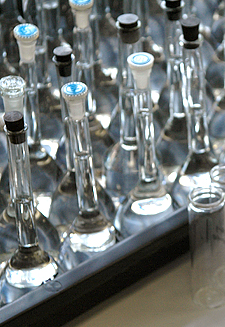Salma Darwish

Salma Darwish
M.Sc. Salma Darwish
Tel ++49 345 55 25188
email: salma.darwish(at)pharmazie.uni-halle.de
Developement of novel HDAC inhibitors for anti-parasitic therapy
Schistosomiasis, also called bilharzia, is one of the major human neglected parasitic diseases, which is caused by small flat worm parasites from the genus Schistosoma. Schistosomes infect around 200 million people worldwide and cause at least 300.000 deaths yearly, with about 800 million people further at risk of infection. The treatment and control of schistosomiasis currently relies on one drug (praziquantel) which over decades has proved to be effective against all major schistosome species causing the disease. However reduced efficiency of this drug, as well as, observed resistance in laboratory strains raises the specter of widespread drug resistance. Such drug resistance represents an increasing problem especially for parasitic diseases for which only a limited number of drugs is available for treatment. Thus the search for potential drug targets and drug candidates against eukaryotic parasites is acute, notably for the major human parasitic diseases for which no effective vaccines are available.
A new approach for targeting eukaryotic parasites is to tackle their dynamic epigenetic machinery that is necessary for the extensive phenotypic changes during the life cycle of the parasite. Recently, we identified S. mansoni histone deacetylase 8 (smHDAC8) as a potential target for antiparasitic therapy. In order to identify inhibitors of smHDAC8, we use a synergistic approach that combines the benefits of structure-based virtual screening, chemical optimization and experimental testing with validated enzyme inhibition assays. In the current project we apply computer- and structure-based methods to study promising parasitic targets, mainly from the class of HDACs. Beside Schistosoma HDACs also the corresponding enzymes from Plasmodium falciparum, Trypanosoma brucei and Leishmania major will be studied. Novel inhibitors will be synthesized and biologally characterized. Another starting point is the development of protein-degrading agents, the so-called PROTACs, for the HDACs under investigation. PROTACs are designed to specifically degrade HDACs in the cells under investigation in order to better understand their biological role.


